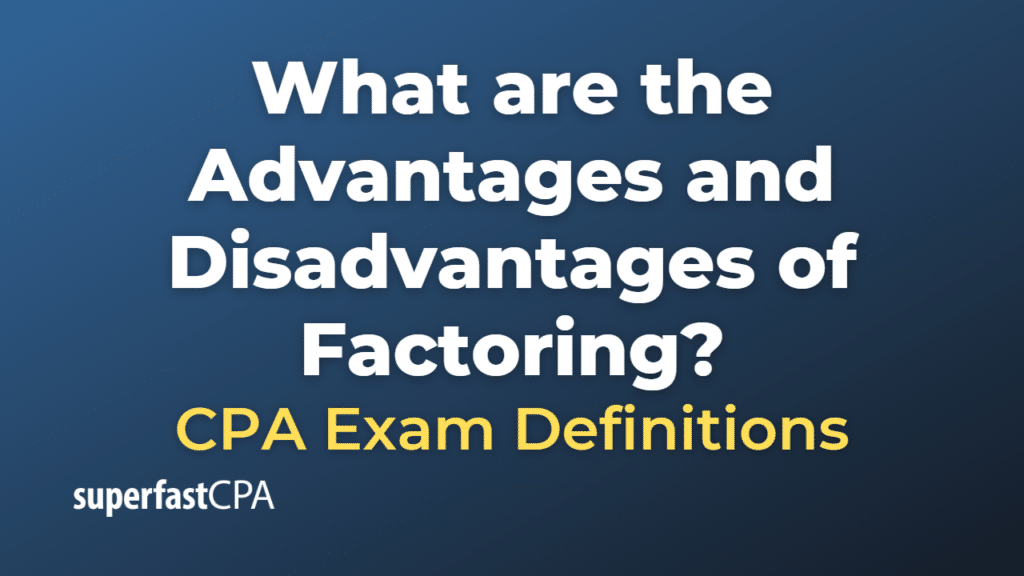Advantages and Disadvantages of Factoring
Factoring can provide a number of advantages and disadvantages for businesses, depending on their individual circumstances. Here are some of the key pros and cons:
Advantages:
- Immediate Liquidity : Factoring provides immediate access to cash, allowing businesses to convert their receivables into cash without the need to wait for customers to pay their invoices.
- Cash Flow Management: It can help businesses manage their cash flows more effectively by providing predictable, immediate payment for their invoices.
- Credit Risk Management: The factoring company assumes the credit risk for the invoices it purchases, so the original business is protected if its customer fails to pay.
- Time and Resources: Factoring can save a business time and resources by transferring the work of pursuing and collecting invoice payments to the factoring company.
Disadvantages:
- Cost: The biggest disadvantage of factoring is the cost. Factoring companies charge a fee for their services, which reduces the total amount of money the original business receives for its invoices.
- Customer Relationships: The factoring company takes over the process of collecting payments, which might impact the original business’s relationships with its customers. Some customers may not like dealing with a third party, or they may view factoring as a sign that the business is in financial distress.
- Not a Solution for Long-Term Issues: While factoring can provide quick access to cash, it’s not a solution to long-term financial issues or a replacement for comprehensive financial management.
- Dependence: Over-reliance on factoring can lead to a cycle of dependence, where a business continually needs upfront cash from factoring to cover its operating costs.
The suitability of factoring as a financial solution will depend on a business’s specific situation, including its cash flow needs, the reliability of its customers, and its ability to absorb the costs associated with factoring.
Example of the Advantages and Disadvantages of Factoring
Imagine a small manufacturing company, “WidgetCo,” that produces high-quality widgets and sells them to large retailers. WidgetCo’s widgets are in high demand, but the company is facing a cash flow problem because the retailers take 90 days to pay their invoices.
To alleviate the cash flow problem, WidgetCo decides to use factoring. They sell their $100,000 invoices to a factoring company, “QuickCash,” for immediate payment of 85% of the invoice value, or $85,000. QuickCash will also handle the collections process.
Here’s how the advantages and disadvantages play out:
Advantages:
- Immediate Liquidity: WidgetCo gets $85,000 right away, which they can use to meet payroll and purchase supplies to continue production.
- Cash Flow Management: This immediate payment helps stabilize WidgetCo’s cash flow, making it easier to plan and budget.
- Credit Risk Management: If a retailer fails to pay the invoice, QuickCash bears the loss, not WidgetCo.
- Time and Resources: WidgetCo no longer needs to invest time and resources in collecting invoice payments, allowing them to focus on their core business.
Disadvantages:
- Cost: QuickCash’s fee is 3% of the invoice value, or $3,000. So WidgetCo ultimately receives only $97,000 for their $100,000 invoice.
- Customer Relationships: One of the retailers is surprised to receive a payment request from QuickCash instead of WidgetCo, and is unhappy about dealing with a third party. This strains WidgetCo’s relationship with the retailer.
- Not a Solution for Long-Term Issues: Although factoring helps with immediate cash flow issues, WidgetCo still needs to work on reducing production costs and negotiating better payment terms with retailers to improve their long-term financial stability.
- Dependence: If WidgetCo begins relying heavily on factoring to maintain cash flow, they might find themselves in a cycle of dependence on QuickCash, always needing immediate cash from new invoices to cover ongoing costs.













